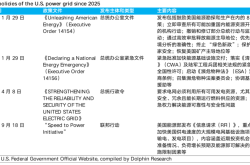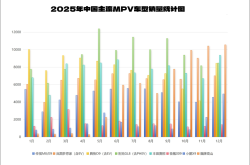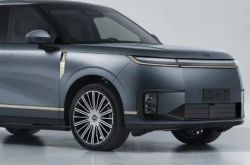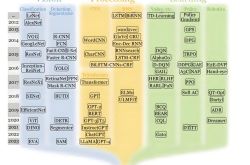Xiaomi YU7 Sells Out, but Tesla is Not the Most Worried
![]() 07/02 2025
07/02 2025
![]() 865
865
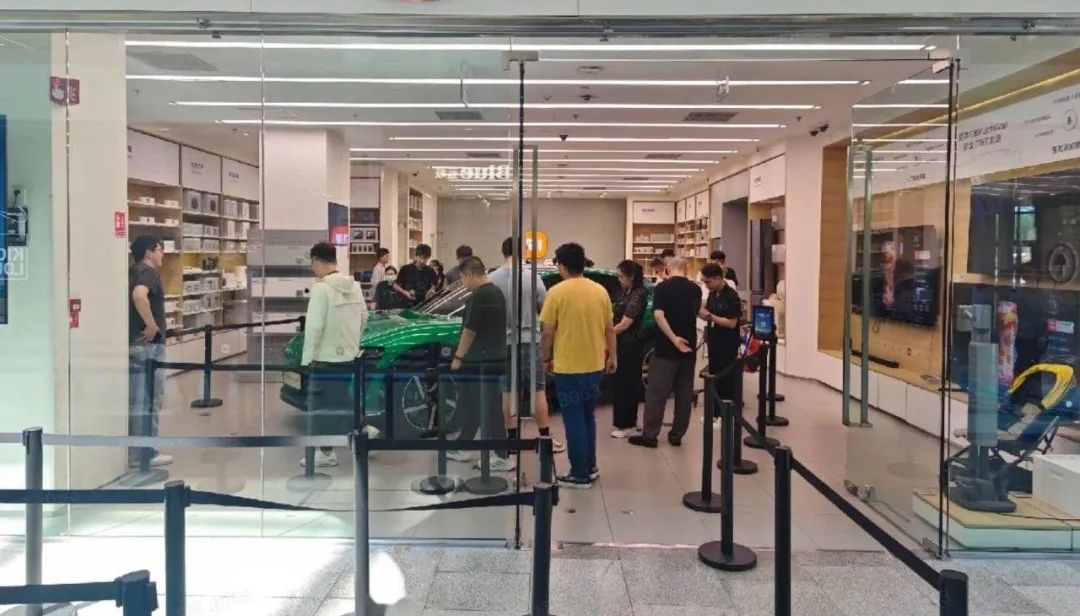
Amidst the "customer poaching" battle, Tesla is not the primary concern.
Produced by | NewProductStrategy Finance & Economics
Author | Wu Wenwu
Xiaomi YU7 has sold out, reaping the benefits, while new automotive players aim to share in the spoils, sparking a "customer poaching" battle. However, it is not Tesla that is most concerned, but rather the new automotive players themselves.
01 Xiaomi YU7 Sells Out, Initiating a "Customer Poaching" Battle
The Chinese new energy vehicle industry has finally reached a moment of exuberance.
In recent days, the automotive industry, the entire internet, and the general public have been buzzing about Xiaomi YU7, with trending topics dominating discussions.
Since the evening of June 26, following the launch of Xiaomi Automobile's second model, Xiaomi YU7, it sold out immediately. Within 3 minutes, over 200,000 orders were placed, exceeding 289,000 within 1 hour and surpassing 240,000 within 18 hours.
Whether it's the exterior design of Xiaomi YU7, its pricing range, or Lei Jun's inspiring speech at the launch event, the launch of Xiaomi YU7 far exceeded Lei Jun and Xiaomi's expectations.
The astonishing pre-order data for Xiaomi YU7 not only set a new record for new car launches in the Chinese automotive industry but is also record-breaking in the global new energy vehicle industry.
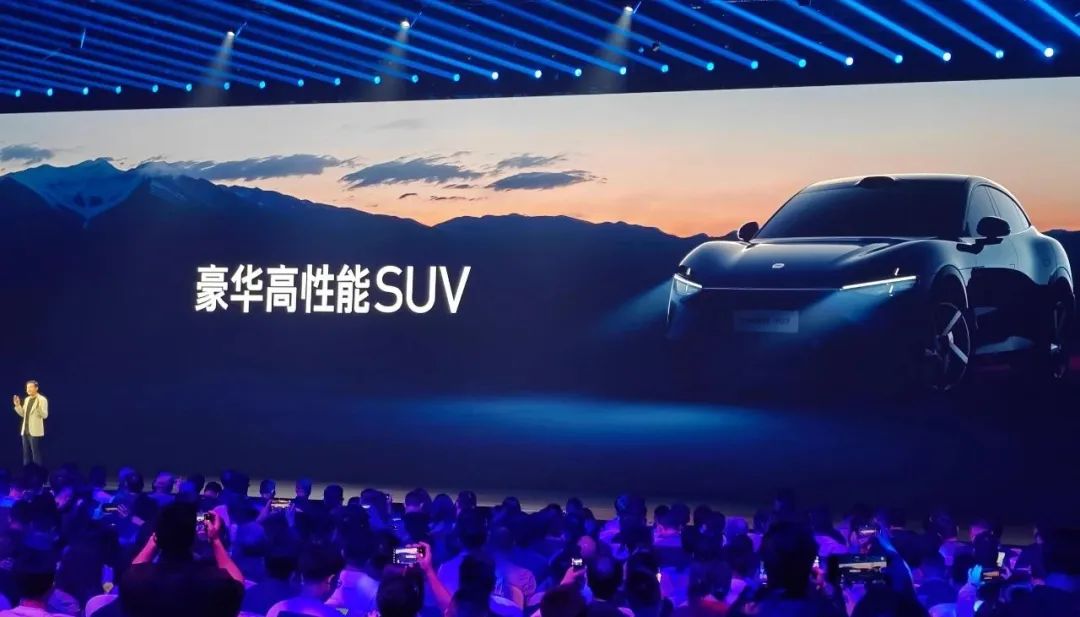
A senior automotive industry insider told NewProductStrategy Finance & Economics on the night of Xiaomi YU7's launch that while the sellout was expected, it still far exceeded market expectations.
With Xiaomi YU7's popularity, it is evident that Xiaomi Automobile is the main protagonist reaping the benefits of this exuberance. However, new automotive players aim to share in the spoils.
Following Xiaomi YU7's sellout, with a delivery period of up to a year, several automakers quickly initiated a "customer poaching" strategy.
According to reports from Cailian Press, as of July 1, NIO, Avatar, and ZEEKR have all introduced compensation policies for users who have pre-ordered multiple brand models, including Xiaomi YU7, to switch to purchasing their own products.
For example, NIO and Avatar offer full compensation in the form of discounted car prices, while ZEEKR rewards users with corresponding points.
According to 21st Century Business Herald, brands such as IM Motors and Intelligent Mobility have also initiated "customer poaching" strategies.
For instance, ZEEKR sales staff in Hubei told reporters that they can reimburse the deposit for YU7. In Changsha, YU7 owners who switch to IM Motors can enjoy deposit reimbursement.
It is evident that other new automotive players are targeting those who have placed deposits for Xiaomi YU7 but do not want to wait too long due to the long delivery period or urgently need a car.
With Xiaomi YU7's popularity, new automotive players are taking the opportunity to conduct hotspot marketing and promotional activities, not only riding on the wave of popularity but also bringing in some sales, achieving multiple benefits with one action.
NewProductStrategy Finance & Economics believes that in the face of Xiaomi YU7's popularity, the "customer poaching" strategy launched by multiple new automotive players is more aptly described as initiating a "customer poaching" battle.
Obviously, this "customer poaching" battle initiated by new automotive players will continue with Xiaomi YU7's popularity, and it remains to be seen who can attract more potential Xiaomi YU7 customers.
02 Behind the "Customer Poaching" Battle, Tesla is Not the Most Worried
Xiaomi YU7's popularity, of course, cannot be separated from its competitors and benchmarks. At the Xiaomi YU7 launch event, Lei Jun compared Xiaomi YU7 with Tesla Model Y.
Many media outlets have compared Xiaomi YU7 with Tesla Model Y in various ways, shouting out views of surpassing and challenging, with one foreign media outlet even commenting that Tesla has encountered its strongest competitor.
However, in the view of NewProductStrategy Finance & Economics, while Xiaomi YU7's popularity will certainly take away some Tesla users, it will not significantly affect Tesla's sales.
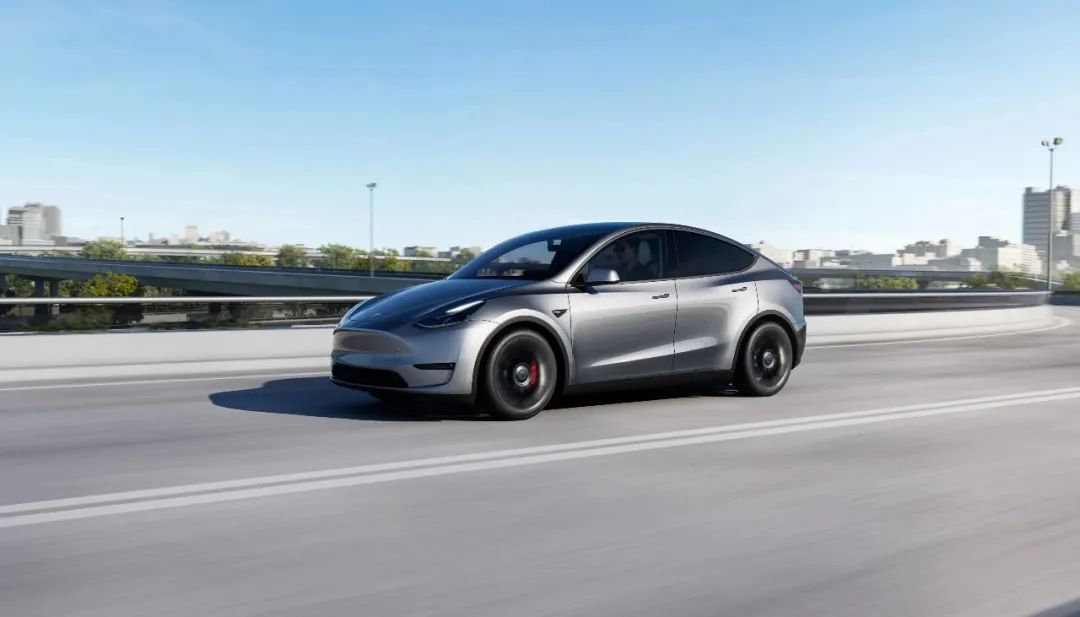
Tesla and Xiaomi's user groups overlap in many ways, but there are also some differences in age, region, occupation, and educational background.
For example, Tesla and Xiaomi's users are mainly concentrated in young groups, with Xiaomi Automobile users mainly in the 20-28 age range, while Tesla's car buyers are more diverse and widespread.
Both Tesla and Xiaomi's users are concentrated in first- and second-tier cities, especially Beijing, Shanghai, Guangzhou, and Shenzhen. The main user groups' occupations and backgrounds also differ. Tesla's users include many engineers, scientists, and white-collar workers with a strong interest in technology and innovation, while Xiaomi's user group is mainly trendy young white-collar workers with dual demands for a sense of technology and brand premium.
With Xiaomi YU7's popularity, Tesla will inevitably feel a sense of crisis and pressure, but with overlapping yet significantly different main user groups, Tesla is not the most worried.
A senior automotive industry insider told NewProductStrategy Finance & Economics that at this stage, Xiaomi YU7's impact on Tesla is limited but will siphon orders from other brands and models.
Therefore, Xiaomi YU7's popularity and the "customer poaching" battle initiated by new automotive players directly reflect the multifaceted nature, human complexities, and underlying anxieties and pressures in the current world of new automotive players.
Obviously, Xiaomi YU7's popularity has created a significant shockwave throughout the world of new automotive players, impacting sales data, psychology, and market expectations.
Last year, Xiaomi Automobile's first model, the SU7, was not an SUV, which relieved several new automotive peers. Now, after the launch of Xiaomi YU7, it has achieved astonishing success and impacted a broader audience.
The shockwave of Xiaomi YU7's popularity will have varying degrees of impact on different peers.
Among those directly affected is XPeng's newly promoted G7 model. Although He Xiaopeng has also placed an order for YU7, the pressure on XPeng G7 under Xiaomi YU7's halo effect is considerable.
Xiaomi YU7 will also have a significant impact on ZEEKR, such as the ZEEKR 7X, and may even affect the current underperforming 001 model, which has lost its halo effect. ZEEKR currently lacks a new blockbuster model.
For NIO, which is currently fully focused on boosting sales, Xiaomi YU7's popularity has little impact due to its different positioning and user groups, but it will have a certain impact on its sub-brand Lido.
More notably, perhaps the most potentially affected by Xiaomi YU7's popularity is Li Auto, whose sales have declined and is fully focused on shifting to the pure electric SUV segment.
According to media reports, Li Ideal issued an internal announcement on June 27 announcing organizational adjustments. In the second half of the year, Li Ideal will launch two pure electric SUVs, the i8 and i6. After last year's MEGA failed to make a dent in the high-end pure electric MPV market, this year's new pure electric models in the second half of the year cannot afford any failures or trial-and-error.
It is reported that the Li Ideal i6 model is positioned lower, and its price range is likely to overlap significantly with Xiaomi YU7, potentially leading to a head-to-head confrontation.
For Leaping Auto, the current leader among new automotive players, Xiaomi YU7's popularity will not have a significant impact in the short term but will inevitably have a considerable impact in the long run.
This "customer poaching" battle initiated by new automotive players is a marketing battle on the surface but also reveals underlying anxieties and pressures.
03 Predictions for the New Energy Vehicle Industry in the Second Half of 2025
Since entering 2025, competition in the new energy vehicle industry has intensified, with new automotive players striving to launch, manufacture, and sell new cars.
The first half of the year has passed, and various new automotive enterprises have released their sales results for June. Combined with sales summaries for the first half of this year, many new automotive enterprises have delivered varying results, with some rejoicing and others worried.
According to statistics from China Business News, in the first half of this year, the cumulative delivery volumes of Zero Run, ZEEKR, and Li Ideal exceeded 200,000 units. XPeng's sales are somewhat disappointing, failing to reach 200,000 units. However, considering the annual sales target set at the beginning of the year, XPeng's cumulative deliveries in the first half have already surpassed last year's total and are the only new automotive enterprise with an annual sales target completion rate exceeding 50%.
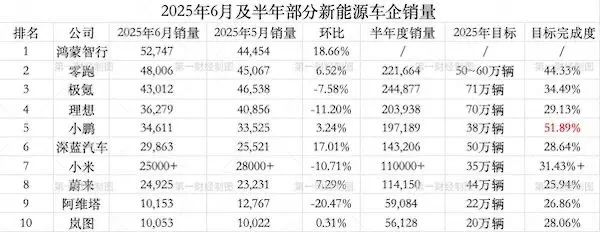 Source / China Business News
Source / China Business News
The annual sales target completion rates of five brands - Li Ideal, Deep Blue, NIO, Hoval, and Avatar - are less than 30%. It can be predicted that these automakers will face immense pressure to achieve their expected annual sales targets in the second half of the year.
Overall, in the race of new automotive players, sales data clearly reflects that the stronger players among the top-ranked new automotive enterprises are becoming even stronger.
The time window for mid-tier and niche new automotive brands is shrinking, and future pressures will only increase.
Although the market had anticipated Xiaomi YU7's launch to be popular, no one expected it to be this explosive, with the sellout data astonishing all new automotive peers. Everyone was looking forward to the YU7 launch, but now that YU7 has sold out, the pressure on everyone has increased.
It can be clearly predicted that Xiaomi YU7 will continue to be popular for a long time in the second half of the year. As long as YU7 remains popular, the pressure on new automotive peers will also increase, and it is even possible that some new automotive enterprises will view Xiaomi Automobile as the next Tesla.
In China's new energy vehicle industry, Tesla remains a competitor that cannot be ignored. In the past, Tesla mainly targeted first- and second-tier cities, but now it is accelerating its presence in lower-tier markets in China and promoting the downsizing of its sales system. Tesla's brand power and attractiveness cannot be overlooked.
Currently, there is a wave of new energy vehicles going to rural areas, with brands like Tesla, NIO, and Avatar being selected for the first time. Obviously, in the second half of 2025, the presence of new energy vehicles in rural areas, especially the increased presence of high-end new energy brands in lower-tier markets, will be a key focus, and a new round of fierce competition in the lower-tier market for new energy vehicles will intensify.
In addition, China's new automotive players can temporarily breathe a sigh of relief as Tesla's progress on its planned lower-priced model for the first half of this year has been slower than expected. If Tesla truly launches a lower-priced model in the future, it will still require the attention of all China's new automotive players.
The ultimate goal of new automotive enterprises' frantic car sales is to achieve profitability, and currently, only one or two new automotive enterprises have achieved this.
Li Bin of NIO has given a clear timeline for profitability, hoping to fully achieve operating targets in the fourth quarter. XPeng Automobile also expects to become profitable in the fourth quarter.
New automotive enterprises that have not yet achieved profitability can only achieve their profitability targets by selling more cars, as the market only believes in sales data.
Currently, China's new energy vehicle industry has entered an elimination stage, as He Xiaopeng once bluntly stated, with 2025 to 2027 being a three-year elimination race.
In the future, who will become increasingly powerful, who will fall behind, and who will disappear will be answered by time.
The cover image and accompanying images in this article are from the internet, and the copyright belongs to the respective copyright owners.


